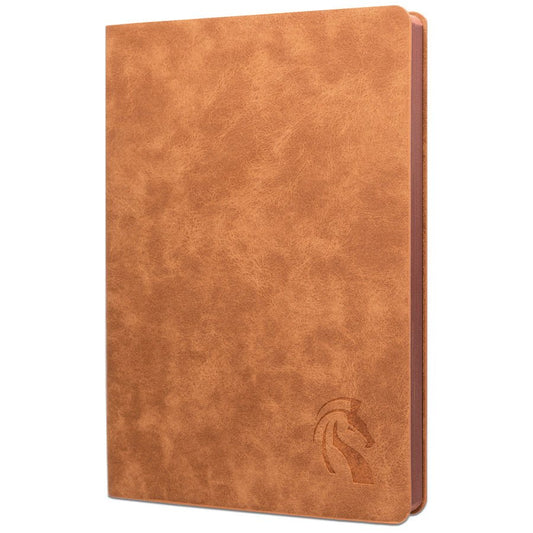
Welcome to your journey of self-discovery and renewal through addiction recovery.
These 50 journal prompts are designed to guide you through exploring your past, embracing the present, and envisioning a healthier future. Recovery is a personal and powerful path filled with challenges and triumphs. Each prompt will help you reflect deeply on your experiences and foster growth.
Grab your journal, and let’s start this transformative exploration together.
Addiction Recovery Insights
- What motivated you to start your recovery journey?
- How do you define recovery in your own words?
- What are three positive changes you’ve noticed since beginning recovery?
- Write about a day you felt particularly strong in your recovery.
- What coping strategies have been most effective for you?
- Describe a challenge you've overcome in your recovery.
- What does a typical day look like for you now compared to before recovery?
- Who supports you the most in your recovery, and how?
- What are you most proud of achieving so far in your recovery?
- How do you handle moments of doubt or fear about recovery?

"Every day sober is a victory. Celebrate every step."
Your Recovery Goals
- What short-term goals are you working towards in your recovery?
- Describe a long-term goal that recovery is helping you achieve.
- What skills are you developing to prevent relapse?
- How do you plan to improve your physical health as part of recovery?
- What are some ways you can strengthen your mental resilience?
- How do you celebrate milestones in your recovery?
- What new activities have you adopted to replace old habits?
- How do you measure progress in your recovery?
- What does success in recovery look like to you?
- What personal strengths have you discovered through your recovery?

"Recovery is not a race, but a life-long journey of discovery."
Addiction Recovery Challenges
- How do you deal with triggers or cravings?
- What has been the toughest part of your recovery journey?
- How do you rebuild trust with others after addiction?
- What lessons have you learned from any setbacks in your recovery?
- How do you stay committed to recovery during tough times?
- What changes have you made to your social environment to support recovery?
- How do you approach social situations that may challenge your recovery?
- Describe how you overcame a recent obstacle in your recovery.
- What advice would you give to someone just starting their recovery?
- How do you maintain hope on difficult days?

"Be kind to yourself; recovery takes time and patience."
Recovery Practices
- How does mindfulness or meditation play a role in your recovery?
- What daily practices help keep you grounded?
- How do you prioritize self-care and why is it important for recovery?
- Describe a relaxation technique that has been particularly helpful.
- What are your strategies for dealing with stress now?
- How has your perspective on life changed since beginning recovery?
- What are some affirmations that motivate you?
- How do you find peace in challenging moments?
- What hobbies or interests have you explored that help your recovery?
- How do you ensure a balanced lifestyle in recovery?

"Strength grows in the moments when you think you can't go on but keep going anyway."
Reflecting on Personal Growth
- What have you learned about yourself through recovery?
- How have your relationships changed since you started recovery?
- What are you grateful for today?
- How do you approach forgiveness, both towards yourself and others?
- What dreams are you more able to pursue now?
- How has your communication improved in recovery?
- What’s something new you’ve learned that surprised you?
- How do you inspire or support others in their recovery?
- What legacy do you want to create moving forward?
- How do you envision your life five years from now?

You've taken meaningful steps to delve into your recovery journey through these reflective prompts. Each question was an opportunity to confront, understand, and celebrate your path to a healthier life. Recovery is an ongoing journey of growth and learning.
Continue to use these prompts as you move forward, allowing them to guide and inspire you. Embrace your progress, and look forward to the bright future you are building each day.
Addiction recovery is a deeply personal and transformative journey that takes time, dedication, and the right tools to help individuals regain control of their lives. Whether you are navigating alcohol addiction, drug dependence, or compulsive behaviors, recovery is a process that involves emotional healing, mental health support, and the pursuit of positive changes. In this article, we will explore how journaling can be a powerful tool for addiction recovery and provide journal prompts to guide individuals on their path to sobriety and personal growth.
The Recovery Journey
Addiction recovery is not a one-size-fits-all process. Each person’s journey is unique, shaped by their experiences, emotions, and challenges. The recovery journey involves more than just breaking free from addictive behaviors—it is a comprehensive process that requires individuals to confront their past self, manage difficult emotions, and develop healthy habits for the future.
Understanding Addiction
Addiction is often rooted in deeper issues such as trauma, mental health problems, and childhood experiences. It affects the mind and body, creating a dependence that can feel impossible to break. For many, the first step in the recovery process is recognizing the need for change and seeking help, whether from addiction treatment centers like Vista Recovery Center or through self-guided methods like journaling.
The Role of Support Systems
No one can recover from addiction in isolation. A strong support system is essential for long-term recovery. This includes family, friends, therapists, and support groups who can provide the encouragement and accountability needed to stay on track. Support systems help individuals navigate the challenges of recovery, from identifying triggers to managing stressors that may lead to relapse.
Journaling: A Powerful Tool in Addiction Recovery
Journaling is a powerful tool that aids in the addiction recovery process. It provides a safe space for individuals to explore their thoughts, emotions, and progress in recovery. Through consistent journaling, individuals can gain clarity about their feelings, set recovery goals, and reflect on their personal growth.
Why Journaling Works
Journaling helps individuals in recovery by promoting self-awareness and mindfulness. By writing about their experiences and emotions, individuals can uncover patterns in their thoughts and behaviors that may contribute to their addiction. Journaling also allows for the expression of difficult emotions such as guilt, shame, and anger, which can often be roadblocks in the healing process.
The Benefits of Recovery Journaling
- Emotional Healing: Writing about painful experiences, traumatic events, or difficult emotions can help individuals process and release negative feelings.
- Personal Accountability: Journaling allows individuals to track their progress and take responsibility for their actions, promoting personal accountability in the recovery journey.
- Stress Relief: Journaling can serve as an outlet for stress and anxiety, providing a healthy way to cope with triggers and stressful situations.
- Goal Setting: Recovery journaling encourages individuals to set both short-term and long-term goals, helping them focus on the future and the positive changes they want to achieve.
- Self-Awareness: By regularly reflecting on their thoughts and behaviors, individuals can become more self-aware, which is key to preventing relapse.
Recovery Journal Prompts
Journaling prompts can be a great way to get started with the journaling practice. Here are some prompts designed to guide individuals through their addiction recovery journey:
- What are the biggest challenges I face in my recovery process?
- How do I feel about the progress I’ve made in my recovery journey so far?
- What are my short-term goals for sobriety?
- How does my past self differ from the person I want to become in recovery?
- What are my long-term goals for recovery and personal growth?
- What triggers or stressors do I need to be mindful of, and how can I avoid them?
- Who is part of my support system, and how can I strengthen my relationships with them?
- What emotions am I struggling with today, and how can I manage them in a healthy way?
- How can I practice gratitude in my daily life to promote healing?
- What positive changes have I noticed in myself since starting my recovery journey?
The Healing Process
The healing process in addiction recovery takes time and involves addressing mental health issues, managing stress, and dealing with trauma. Writing about these aspects in a journal allows individuals to reflect on their emotional healing and recognize their growth over time.
Managing Mental Health and Stress
Mental health is a critical component of recovery. Many individuals in addiction recovery also struggle with mental health issues such as depression, anxiety, or PTSD. Journaling is a valuable tool for managing these conditions, as it allows individuals to express their thoughts and feelings in a safe space. It is also helpful for identifying stressors and developing strategies to cope with stress.
Dealing with Triggers and Relapse
Triggers are situations, emotions, or people that may cause an individual to relapse into addictive behavior. Identifying these triggers is an important part of the recovery process. Journaling helps individuals recognize their triggers and develop coping mechanisms to avoid relapse. Writing down feelings of temptation or moments of weakness can also provide clarity and help individuals stay committed to their recovery goals.
Setting Recovery Goals
Goal setting is a vital aspect of addiction recovery. Establishing both short-term and long-term goals allows individuals to focus on their future self and the positive changes they want to make. Writing about these goals in a recovery journal provides motivation and helps track progress.
Short-Term and Long-Term Goals
- Short-Term Goals: These are immediate goals that individuals can achieve in a shorter timeframe, such as staying sober for a day, a week, or a month.
- Long-Term Goals: Long-term goals involve larger, more comprehensive achievements, such as maintaining sobriety for a year, improving mental health, or mending relationships with loved ones.
Both types of goals are important in the recovery process and can be reinforced through consistent journaling. Writing about recovery goals helps individuals visualize their success and provides a roadmap for achieving them.
Addiction Recovery Journal Prompts for Goal Setting
- What is my biggest goal for recovery, and why is it important to me?
- What short-term goals can I set to help me achieve long-term sobriety?
- How can I stay motivated to reach my recovery goals, even when things get tough?
- What positive changes do I want to see in my life in the next year?
- How can I use journaling as a tool to stay accountable to my recovery goals?
The Importance of Gratitude and Positive Affirmations
Gratitude and positive affirmations are powerful tools that can enhance the recovery journey. Expressing gratitude for the progress made in recovery helps individuals focus on the positive aspects of their life, while affirmations reinforce self-worth and belief in the ability to overcome addiction.
Incorporating Gratitude into Journaling
Writing a list of things to be grateful for each day is a simple yet effective journaling practice. It shifts the focus from negative experiences to the positive aspects of life, promoting emotional healing and a sense of contentment.
Positive Affirmations for Recovery
- I am strong enough to overcome addiction.
- I am in control of my thoughts, emotions, and actions.
- Each day of sobriety brings me closer to my goals.
- I am worthy of healing and personal growth.
- I am grateful for the support system in my life.
Conclusion: A Lifelong Journey
Addiction recovery is a lifelong journey filled with challenges and triumphs. The recovery process requires dedication, self-awareness, and a willingness to face difficult emotions head-on. Journaling provides individuals with a valuable tool for reflection, emotional healing, and personal accountability. By incorporating journaling prompts, gratitude, and positive affirmations into the recovery process, individuals can create a safe space for personal growth and continue their journey toward long-term sobriety and mental health.
Whether you are just beginning your addiction recovery journey or are well on your way, remember that recovery is possible, and each day brings new opportunities for healing and progress. Keep writing, keep reflecting, and keep moving forward toward a brighter, sober future.
Journal Prompts For Addiction Recovery and Growth
Healing starts with one written word—explore these recovery-focused prompts to support your journey.
“These prompts helped me reconnect with hope and self-trust.”Journal prompts for those in addiction recovery can offer peace, clarity, and self-compassion.
const prompts = "journal prompts for addiction recovery";
Click to Open Prompts
Daily healing prompts for journaling through addiction recovery- Emotion Check-in
- What are you feeling in this moment?
Read Other Related Journal Prompts
50 Autumn Journal Prompts50 Journal Prompts for Emotional Healing
50 Journal Prompts For Bedtime Reflection
50 Journal Prompts For Those Enjoying Music














7 comments
This is now my best line “Strength grows in the moments when you think you can’t go on but keep going anyway.”
Thanks for that …it helps me a lot for developing my experience
Wow nice and interesting site.
Excellent questionnaire, addiction in any area is really a problem and sometimes the person does not even realize it, filling out this guide The healing process is advanced because it seals every doubt.
This blog post is an incredibly thoughtful and comprehensive resource for anyone on their recovery journey. The prompts are insightful and well-structured, guiding individuals through self-reflection and growth. It’s clear that a lot of care went into creating this guide, making it an invaluable tool for fostering resilience and hope. Thank you for sharing such a powerful and supportive resource.